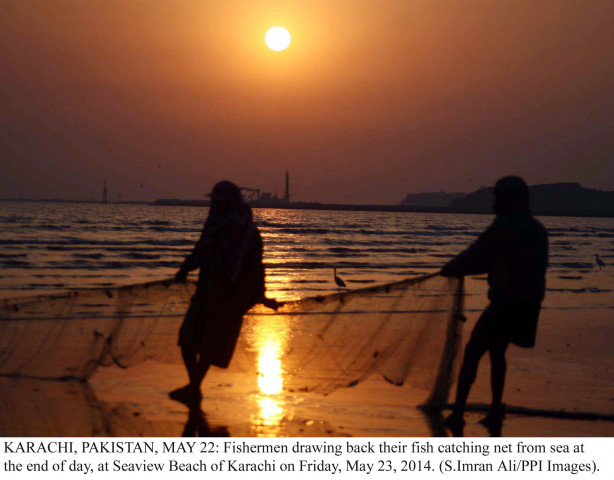Sea-saw: Climate change makes Karachi feel under the weather
Speakers at a conference highlight importance of tackling the issue.

"We have to protect the mangroves," Senator urged. PHOTO: PPI
Karachi is in danger! There were nearly 200 islands along Sindh's coastal belt in 1890. Now, no more than 40 remain. The danger is due to sea erosion and possible cyclones because of the climate change, said senator Karim Ahmed Khawaja.
"We have to protect the mangroves," he said. "Movement of water at downstream Kotri is also concerning as about a million acres of land has been eroded in Badin and Thatta. The erosion has even affected Tando Muhammad Khan and soon it will hit Hyderabad if we don't take appropriate measures."
Speaking at the 'Climate Change Adaptation Conference' on Thursday, organised by Focus Humanitarian Assistance Programme in collaboration with NED University of Engineering and Technology, Khawaja said that it is the federal government's responsibility to look after the affairs of climate-related issues. "Rice and wheat was in abundance in Sindh in the 1920s, when workers from Middle Eastern countries used to come here. Now the province starves as nothing to eat remains. And all of this is down to climate change."
The next speaker talked about an increase in temperature and sea level and the impact of the changes . "The rise in average temperature is up to 0.6 to one degree centigrade along the coastal belt and sea level has risen annually at an approximate average rate of 1.2 millimetres per year for the past five decades," said Pakistan Meteorological Department deputy director Zubair Ahmed Siddiqui. "These changes have been directly affecting the weather pattern along the coastal belt."
Siddiqui warned that if the issue is not addressed then Sindh's coast will experience the brunt of nature's wrath. "Extreme events, such as wind storms and tropical cyclones, are occurring much more frequently now than what they used to in the past," he said. "They are warnings of a dramatic increase in damages through catastrophes."
Siddiqui was then followed by researcher Areba Syed, whose findings also indicated that the climate of Sindh's coast is changing. However, she was not as dramatic as the others before her. "The temperature is decreasing in Karachi," she claimed, having compared the temperatures of Mumbai and Dubai to Karachi's over the past half a century. "Wind speeds in Karachi are decreasing but in Mumbai and Dubai, they are increasing."
Meteorologist and Lead Pakistan senior advisor, Dr Qamaruz Zaman Chaudhry, stressed on a community based approach to accelerate the implementation of climate change adaptation practices in coastal areas. "The plans developed by local communities consider local contextual needs and constraints that ensure community ownership," he said.
Demographic trends show rapid urbanisation in Karachi, with an average annual rate of urbanisation exceeding four per cent per year since 1951. Rapid growth in Karachi has exacerbated environmental challenges and the city has struggled to improve aspects of basic infrastructure: roads, water pipes and sanitation.
"The green spaces in the city are reducing due to encroachments," said Sustainable Initiatives executive director Farhan Anwar. Talking on the impact of the rise in temperature in the city, he said that the centre of the city is affected more due to human activities and congestion.
Former federal minister Javed Jabbar said that government organisations, academic institutions and scholars need to make a collective effort to revise the overall climate change framework and policies.
"Climate change is fast becoming a serious concern for the country where a significant percentage of the population is living below the poverty line and is more vulnerable to disasters," said Focus Humanitarian Assistance Pakistan Chairperson Khadija Jamal Shaban.
Engineer Pervez Sadiq, attempted to present both sides of the story. "Go and see what you have in Astola Island; you'll enjoy it," he suggested hall. "You don't know how beautiful Karachi is.
There was a time when young boys used to dive for coins from the waters at the Native Jetty Bridge but now the water is murky and polluted."
Published in The Express Tribune, May 24th, 2014.



















COMMENTS
Comments are moderated and generally will be posted if they are on-topic and not abusive.
For more information, please see our Comments FAQ